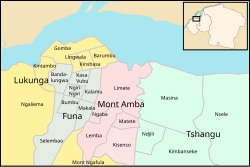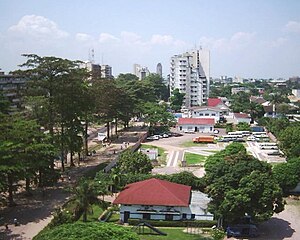Lukunga is an area of the capital city of Kinshasa, Democratic Republic of the Congo, comprising seven of the city-province's twenty-four administrative divisions—the communes of Barumbu, Gombe, Kinshasa, Kintambo, Lingwala, Mont Ngafula and Ngaliema. It is one of the four so-called districts of Kinshasa. These were the administrative divisions of Kinshasa during much of the Mobutu years (1965-1997)[1] and around which a number of government systems and services are still organized. For instance, Lukunga makes up a fourteen-member National Assembly constituency designated as Kinshasa I.[2] However, these districts are not part of Congo's territorial organization.[3]
Lukunga District | |
|---|---|
 Kinshasa districts and communes, Lukunga to the west | |
| Coordinates: 4°18′19″S 15°18′12″E / 4.3054°S 15.3032°E | |
| Country | |
| City-Province | Kinshasa |
The district takes its name from the Lukunga River.[4] This is a critical source of water for the district, compromised by silting.[5]
-
Théâtre de Verdure, an open-air theater in Ngaliema, 1974
-
The boulevard of 30 June in Gombe, Kinshasa
References
edit- ^ "Ordonnance 77-100 du 6 avril 1977 fixant les limites de la ville de Kinshasa, ainsi que le nombre de ses sous-régions et zones, leur dénomination et leurs limites" (PDF). www.droitcongolais.info (in French). Art. 2-3. Archived (PDF) from the original on 18 Aug 2016. Retrieved 21 August 2020.
- ^ "Annexes a la loi portant adoption de la repartition des sieges par circonscription electorale pour les elections legislatives" (PDF). www.ceni.cd (in French). CENI. pp. 4, 9. Archived (PDF) from the original on 20 Sep 2018. Retrieved 10 May 2019.
- ^ Institut National de la Statistique–RD Congo (2019). Annuaire Statistique RDC 2017 (PDF) (in French). p. 36 Tableau 1.2. Archived (PDF) from the original on 14 June 2020. Retrieved 22 August 2020.
- ^ Nzuzi, Francis Lelo (2008). Kinshasa: ville et environnement. Editions L'Harmattan. p. 132. ISBN 978-2-296-06080-7.
- ^ "Watershed degradation increases water treatment costs". UNEP DR Congo. 2008. Retrieved 2011-11-30.

